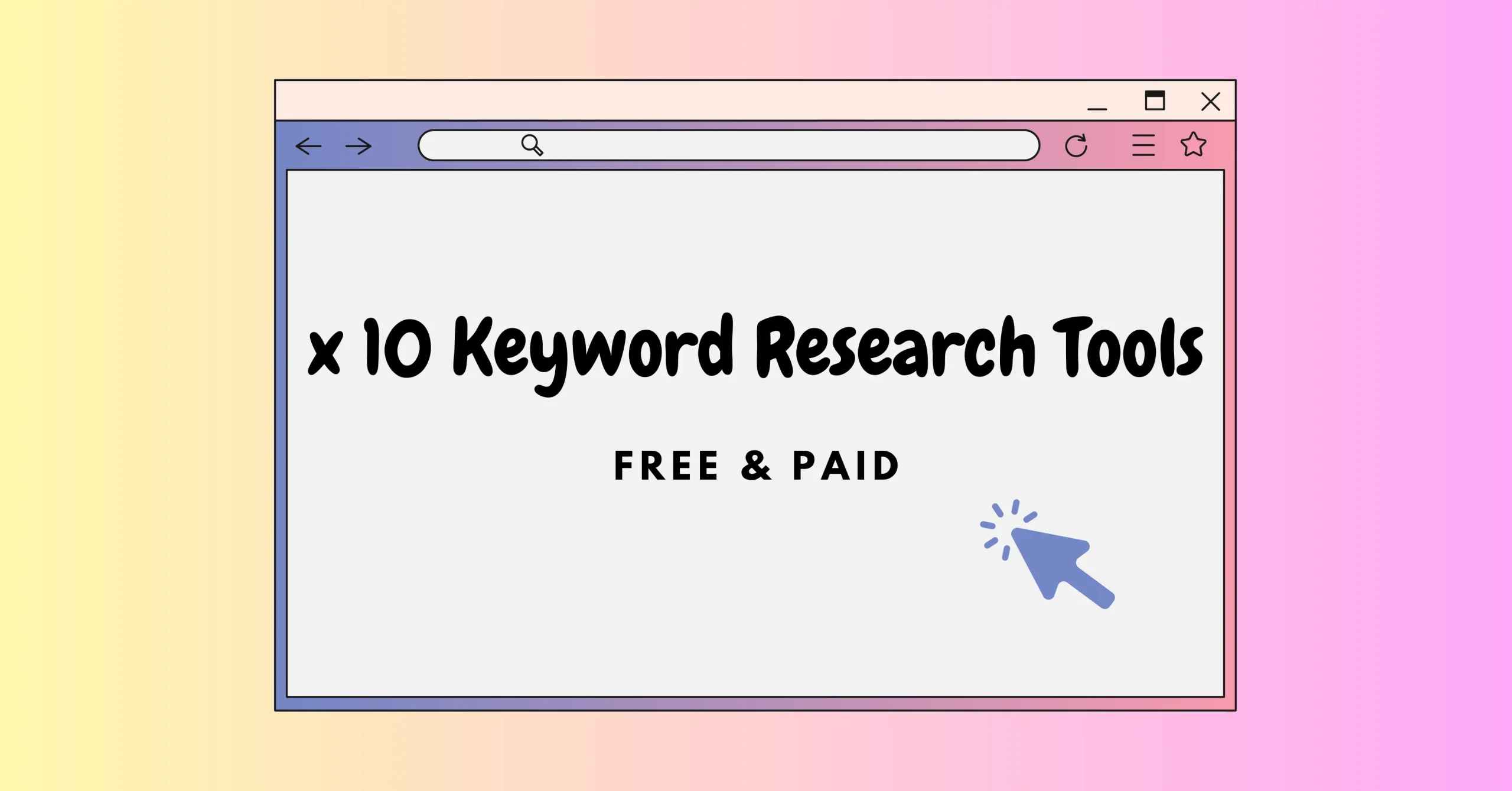Introduction
An estimated 93% of online experiences begin with a search engine. This statistic alone underscores SEO’s massive role in your digital strategy. Whether you’re a budding entrepreneur who wants you to increase his website presence and grow their business or part of a seasoned marketing team, you must increase your website’s visibility without getting lost in the technical jargon of SEO. The right SEO tools are your secret weapon in climbing the top of search results and a must-gain opportunity. Here, we will guide you through a curated list of the top 10 SEO research tools, detailing their cost (free or paid), pros, cons, key features, and much more. So you can make complex choices simple and accessible, even if you’re as young as 10! By the end, you’ll understand why leveraging these tools is beneficial and essential for your success in your website.
Table of Contents
What is SEO
Search Engine Optimization (SEO) is all about improving a website’s visibility and ranking and how your website shows up on any search engine, usually Google. Whether you are a blogger, offering services, running an online store, or anything else, SEO is a must-have in your backpack. Various tools are used in SEO for multiple purposes, such as Niche Research, Keyword Research, Competitor Analysis, Link Research, Site Audit, etc. Let’s dive into the depths and find out which tools suit you. Whether you are a beginner or an expert, we have something for everyone.
Top 10 SEO Research Tools in 2024
In the upcoming tools list, we ensure to list the top ranking and best tools in SEO Research. Our selection includes both free and paid tools, ensuring there’s something for everyone regardless of budget. We believe that everyone, regardless of their SEO knowledge or budget, should have access to these powerful tools. Here’s what makes each tool stand out in the crowded market of SEO resources:
1) Google Keyword Planner (Free)
Perfect for beginners and available for free, Google Keyword Planner helps you discover keywords related to your business and see how many people are searching for them. It’s a great starting point for any SEO strategy.
Free vs. Paid: Free
Top Features/Benefits: Direct integration with Google Ads, access to search volume data and trends.
Who It’sBest For: Beginners and small businesses starting PPC campaigns.
Potential Drawbacks: Limited by Google’s own ecosystem, data may be skewed towards advertisers.
Pricing: Free
2) SEMrush (Paid)
Semrush is like the Swiss Army knife of SEO tools. It’s not just for keyword research; it also helps you analyze your competition, track your rankings, and even audit your website for improvements. We’ve thoroughly reviewed each tool to ensure you have all the information you need to make an informed decision. Learn more about SEMrush.
Free vs. Paid: Paid with a free 7-day trial
Top Features/Benefits: Comprehensive keyword research, site audit capabilities, and competitive analysis.
Who It’s Best For: SEO professionals and larger agencies.
Potential Drawbacks: It has a Complex interface with a steep learning curve, and of course, it is paid, so it is not accessible to everyone.
Pricing: Plans start at $119.95 per Month.
3) Ahrefs (Free & Paid)
Ahrefs offers deep dive data and is considered to be the best among all other SEO research tools that show you keyword difficulty, search volume, and the estimated clicks you might receive. Their detailed reports help you decide not just which keywords to target but also how hard it will be to rank for them. Learn more about Ahrefs.
Free vs. Paid: Paid with limited free tools
Top Features/Benefits: Robust backlink analysis, organic search reports, and keyword tracking.
Who It’s Best For: Mid to large-sized companies focusing on building online presence.
Potential Drawbacks: High costs can be prohibitive for smaller businesses.
Pricing: Basic plan starts at $99 per Month.
4) Moz Pro (Paid)
Moz Pro makes finding keywords a breeze with suggestions and SERP analysis features. What’s unique here is their “Priority” score, which helps you pick keywords that offer the best combination of search volume, difficulty, and opportunity. Also, Moz is considered to have the best and most accurate KD (Keyword Difficulty).
Free vs. Paid: Paid with a free trial
Top Features/Benefits: Site audits, rank tracking, and SEO insights.
Who It’s Best For: Businesses of all sizes seek an all-in-one SEO solution.
Potential Drawbacks: Sometimes slower to update than competitors.
Pricing: Standard plan starts at $99 per Month.
5) Majestic (Paid)
Majestic is renowned for its extensive link analysis database and tools like Trust Flow and Citation Flow, which measure the quality and quantity of links leading to and from a site. It also provides a detailed backlink history and a graphical representation of link ecosystems.
Free vs. Paid: Paid, with a limited free version for verified domains.
Top Features/Benefits: Extensive backlink data and Trust Flow metrics.
Who It’s Best For: SEO professionals and marketers focused on advanced link-building and backlink strategies.
Potential Drawbacks: Can be complex for beginners, as it focuses heavily on link data without broader SEO features like keyword research or content optimization.
Pricing: Plans start at $49.99 per Month.
6) SpyFu (Paid)
SpyFu is excellent for those interested in digging into the competitive intelligence aspect of SEO. It provides detailed insights into your competitors’ search marketing tactics, including the keywords they buy on Google Ads, the organic ranks they hold, and the variations of ad tests they run. It also features a keyword tracking tool that monitors keyword rankings over time.
Free vs. Paid: Paid, but offers some free features.
Top Features/Benefits: Competitor keyword research and PPC analytics.
Who It’s Best For: Marketers, businesses, and agencies that focus on understanding and outmaneuvering their competition in organic and paid search.
Potential Drawbacks: While incredibly powerful for PPC and SEO analysis, it might provide more data than necessary for those just starting out or with simpler needs. Its focus on U.S. markets also limits it.
Pricing: Basic plan starts at $39 per Month.
7) Ubersuggest (Free & Paid)
bersuggest provides a comprehensive set of tools, including keyword suggestions, SERP analysis, site audits, and content ideas. One of its standout features is the ability to quickly generate a list of keyword ideas based on a single seed keyword, along with insights into the estimated search volume, competition, and potential profitability of those keywords.
Free vs. Paid: Free version available; paid plans offer more features
Top Features/Benefits: Keyword discovery, Site Audit, content ideas, and backlink data.
Who It’s Best For: Ideal for bloggers, small business owners, and freelancers who need straightforward SEO tools without a steep learning curve.
Potential Drawbacks: Features can be basic and limited in scope and depth compared to more advanced tools.
Pricing: Pro plans start at $29 per Month.
8) Screaming Frog SEO Spider (Free & Paid)
Screaming Frog SEO Spider is a desktop software that allows you to crawl websites to analyze and audit technical and onsite SEO. It’s mainly known for its ability to quickly identify broken links, audit redirects, discover duplicate content, generate XML sitemaps, and extract data with XPath. The tool also integrates with Google Analytics, Google Search Console, and PageSpeed Insights to provide deeper insights into SEO performance.
Free vs. Paid: Offers both versions—a free version with basic features and a paid version that provides comprehensive capabilities.
Top Features/Benefits: Deep site audits, duplicate content detection, and server error identification.
Who It’s Best For: SEO experts, professionals, and agencies that require detailed technical audits and onsite analysis.
Potential Drawbacks: The interface can be intimidating for beginners, and the sheer volume of data available can be overwhelming for those not familiar with advanced SEO tactics.
Pricing: License costs £149 per year.
9) SERanking (Paid)
SERanking is an SEO platform that provides a comprehensive suite of tools, including keyword rank tracking, competitor analysis, website audits, backlink checking, and more. It’s particularly praised for its accurate tracking of search engine rankings and the ability to monitor competitors’ SEO strategies. SE Ranking also includes a social media management tool and a marketing plan feature that guides users through SEO tasks.
Free vs. Paid: Paid, but offers a 14-day free trial to test out its features.
Top Features/Benefits: A universal toolset that includes keyword rank tracking, website audits, and competitor analysis.
Who It’s Best For: SEO professionals and businesses looking for a cost-effective tool. Suitable for a wide range of users, from freelancers and small businesses to large agencies and enterprises looking for an all-in-one SEO solution.
Potential Drawbacks: While it offers a broad range of features, the depth in some specific regions, such as technical SEO, might be less comprehensive than that of tools like Screaming Frog.
Pricing: Plans start at $22/Month when billed annually.
10) KWFinder by Mangools (Paid)
KWFinder specializes in finding long-tail keywords with low SEO competition, making it ideal for identifying niche opportunities and optimizing content strategies. The tool provides detailed keyword data, including search volume, trend, CPC, and competition level, and integrates seamlessly with other SEO tools for a comprehensive analysis. KWFinder’s interface is user-friendly, focusing on a clean and straightforward presentation of data.
Free vs. Paid: Paid, but offers a limited free trial.
Top Features/Benefits: Keyword research, SERP analysis, and SEO metric insights.
Who It’s Best For: Bloggers, small business owners, and SEO beginners who are looking for an accessible entry point into keyword research without being overwhelmed by too much information.
Potential Drawbacks: The database is more limited than that of competitors like Ahrefs or SEMrush.
Pricing: Basic plans start at $29.00 per Month.
Additional Considerations
- How to Choose the Right SEO Tool?
While choosing which tool is the best fit for you, do not ever go for the “Popular” one. Always consider your business size, specific SEO needs, and budget, whether they involve keyword tracking, competitive analysis, or content optimization.
- Trends to Watch
As you navigate the world of SEO, keep an eye on trends like AI-driven content creation, voice search optimization, image search optimization, and the increasing importance of video content. Tools that adapt to these trends will provide the greatest advantage.
Conclusion
While tools like SEMrush and Ahrefs offer comprehensive features for seasoned marketers, Google Keyword Planner provides invaluable insights for those just starting out. Evaluate each tool’s features, ease of use, and budget alignment to make the best choice for your needs.
Have you got a favorite SEO tool or question about these options? Please share your thoughts in the comments or sign up for our email list to receive more insightful content on mastering SEO in 2024.
Guidelines For Success
Remember, the most effective content doesn’t just list tools—it also provides unique insights and real-world applications. Use personal experiences to illustrate how specific tools have concretely benefitted your SEO efforts, if possible. Lastly, ensure that your content is visually engaging and accurate, with the latest information on pricing and features to aid your readers in making informed decisions.


The professionalism and expertise displayed in this post are outstanding. Your detailed analysis and clear explanations make this a must-read for anyone looking to gain a deeper understanding of the topic.